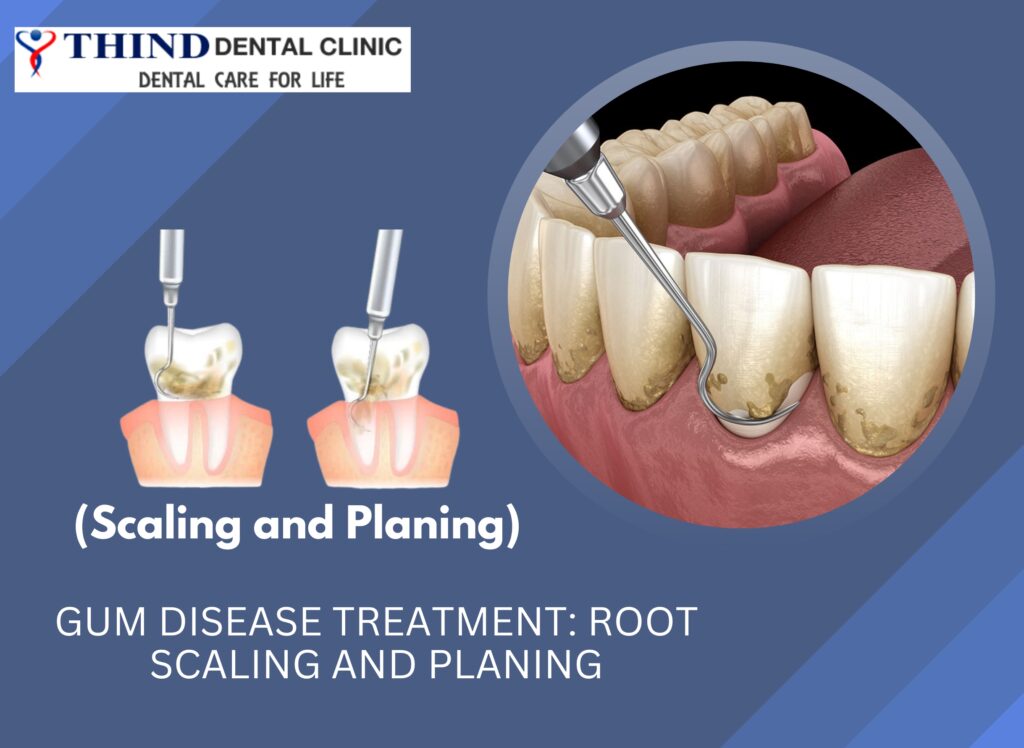Gum disease, or periodontal disease, is a common but serious oral health issue that affects many individuals. At Thind Dental Clinic in Ludhiana, we prioritize the comprehensive care of our patients, and addressing gum disease is a crucial aspect of maintaining optimal oral health. In this article, we will delve into the details of gum disease treatment, specifically focusing on the effectiveness of root scaling and planing, and how these procedures contribute to restoring gum health.
Understanding Gum Disease
Gum disease is an inflammatory condition affecting the tissues that surround and support the teeth. It typically begins with the accumulation of plaque—a sticky film of bacteria—on the teeth and along the gumline. When not effectively removed through regular brushing and flossing, plaque can harden into tartar, leading to the development of gum disease.
Gum disease has two distinct stages:
1. Gingivitis: This is the early stage of gum disease and is characterized by red, swollen gums that may bleed during brushing or flossing. Gingivitis can be reversed with good oral care and regular professional dental cleanings.
2. Periodontitis: If gingivitis is left untreated, it can progress to periodontitis, a more severe stage of gum disease. Periodontitis involves the inflammation of the supporting structures around the teeth, including the bone. It can lead to gum recession, pockets forming between the teeth and gums, and eventual tooth loss.
The Role of Root Scaling and Planing in Gum Disease Treatment
Root scaling and planing are non-surgical procedures designed to treat gum disease and restore the health of the gums. These treatments are often recommended when gum disease has progressed beyond the gingivitis stage and involve the formation of pockets and the presence of tartar below the gumline.
1. Root Scaling
Root scaling is the process of removing plaque and tartar from the surfaces of the tooth roots. This is done using specialized instruments that can reach below the gumline. The goal is to eliminate the source of infection and prevent further progression of gum disease. By thoroughly cleaning the tooth roots, the dentist creates a smooth surface that allows the gums to reattach to the teeth.
2. Root Planing
Root planing involves smoothing the surfaces of the tooth roots after scaling. This helps to prevent the reattachment of bacteria and promotes the healing of the gums. The procedure also removes any rough areas on the roots where bacteria can easily accumulate. Root planing aims to create an environment that is less favorable for the growth of harmful bacteria, supporting the overall health of the gums.
The Procedure: What to Expect
1. Dental Examination and Assessment
Before root scaling and planing, a thorough dental examination is conducted. X-rays may be taken to assess the extent of gum disease and identify any underlying issues. The dentist will evaluate the depth of pockets between the teeth and gums and determine the appropriate course of treatment.
2. Administration of Local Anesthesia
Root scaling and planing are often performed with the administration of local anesthesia to ensure the comfort of the patient. This numbs the affected areas, making the procedure virtually painless.
3. Scaling Process
During the scaling process, the dentist uses special instruments to remove plaque and tartar from the tooth roots and below the gumline. This rigorous washing is critical for removing the source of the infection.
4. Planing Process
Following scaling, the planing process involves smoothing the surfaces of the tooth roots. This helps to prevent the reattachment of bacteria and promotes the healing of the gums. Planing also reduces the likelihood of tartar accumulation in the future.
5. Follow-Up Appointments
After the initial root scaling and planing, patients may be scheduled for follow-up appointments to monitor the healing process. Additional cleanings and evaluations may be necessary to ensure the effectiveness of the treatment.
Advantages of Root Scaling and Planing
1. Effectiveness in Treating Gum Disease
Root scaling and planing are highly effective in treating gum disease, especially when it has progressed beyond the early stage of gingivitis. These procedures address the root cause of the infection and promote the healing of the gums.
2. Non-Surgical Approach
Unlike surgical procedures for advanced gum disease, root scaling, and planing are non-surgical treatments. This makes them a more conservative option for addressing gum health issues.
3. Prevention of Tooth Loss
By treating gum disease and eliminating infection, root scaling and planing contribute to preventing tooth loss. The procedures support the stability of the teeth by promoting gum reattachment and reducing inflammation.
4. Improvement in Oral Health
Root scaling and planing not only treat gum disease but also contribute to overall oral health. The removal of tartar and bacteria from the tooth roots creates a healthier environment, reducing the risk of future infections.
Post-Treatment Care and Maintenance
After undergoing root scaling and planing, patients are provided with post-treatment care instructions to support the healing process. These may include:
1. Regular Oral Hygiene Practices
Maintaining excellent oral hygiene practices at home is crucial for preventing the recurrence of gum disease. Patients are advised to brush their teeth at least twice a day, floss daily, and use antimicrobial mouthwash as recommended.
2. Follow-Up Appointments
Follow-up appointments are scheduled to monitor the healing process and assess the effectiveness of the treatment. Additional cleanings may be recommended to maintain gum health.
3. Lifestyle Modifications
In some cases, lifestyle modifications may be recommended to reduce risk factors for gum disease. This may include quitting smoking, managing stress, and adopting a well-balanced diet.
Thind Dental Clinic’s Commitment to Gum Health
At Thind Dental Clinic in Ludhiana, we are committed to providing comprehensive care that prioritizes the health of your gums and teeth. Our experienced dental professionals conduct thorough assessments to determine the most appropriate treatment for gum disease, including the consideration of root scaling and planing when necessary.
Conclusion
Gum disease is a prevalent oral health issue that requires timely and effective intervention. Root scaling and planing at Thind Dental Clinic in Ludhiana offer a non-surgical approach to treating gum disease, promoting healing, and preventing further complications.
If you have concerns about gum disease or would like to schedule a dental examination, contact Thind Dental Clinic today. Our dedicated team is here to support you on your journey to optimal gum health and a vibrant smile.
For additional information or to arrange an appointment with us
You can contact us at +91-92568-92568
or visit us at:
THIND DENTAL CLINIC
11-12-13-14 H.I.G Market, Opposite Water Tank, Ludhiana, Punjab 141010.
Also Read:
Single Sitting Procedure: Painless and Affordable Dental Care at Thind Dental Clinic
Dental Care for Children: Expert Tips for Parents on Caring for Your Child’s Teeth
The Importance and Benefits of Regular Dental Checkups: Ensuring Optimal Oral Health
Professional Dental Implants: Restoring Smiles with Precision and Care at Thind Dental Clinic in Ludhiana

 Timings
Timings


